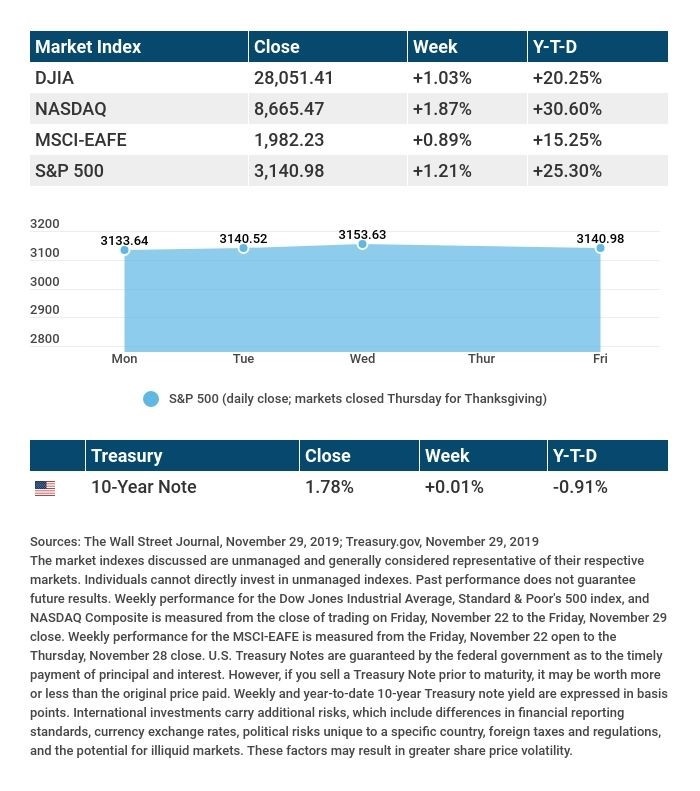The Week on Wall Street
As November wrapped up, U.S. equity benchmarks advanced. Stocks were again aided by a sense of optimism that a preliminary U.S.-China trade deal could be near.
For the week, the Nasdaq Composite added 1.87%; the S&P 500, 1.21%; the Dow Jones Industrial Average, 1.03%. The MSCI EAFE index, which measures the performance of developed stock markets outside North America, gained 0.89%.[1][2]
Markets Wait for News of a Trade Pact
Wednesday, a senior White House official told Politico that the U.S. was “millimeters away” from a phase-one trade agreement with China, a deal that might involve the removal of certain tariffs.
Still, friction remains within the Sino-American relationship. Last week, President Trump signed two bills into law backing pro-democracy demonstrators in Hong Kong. China’s Ministry of Foreign Affairs quickly reacted, stating that American lawmakers had “sinister intentions” and adding that China would take “strong counter-measures” in return.[3][4]
The Latest on Consumer Spending and Consumer Confidence
Personal spending was up 0.3% in October, according to the Department of Commerce. This happened even with no gain in household incomes.
The Conference Board said its Consumer Confidence Index came in at 125.5 for November. Even though it has declined for four straight months, the index remains well above levels seen during the first half of the decade.[5][6]
THE WEEK AHEAD: KEY ECONOMIC DATA
Monday: The Institute for Supply Management provides its latest monthly index of U.S. manufacturing activity (November).
Wednesday: The ISM presents its November Non-Manufacturing Index, and Automatic Data Processing (ADP) publishes its November payrolls report.
Friday: November hiring data arrives from the Department of Labor, and the University of Michigan’s preliminary December Consumer Sentiment Index appears.
Source: Econoday, November 29, 2019
The Econoday economic calendar lists upcoming U.S. economic data releases (including key economic indicators), Federal Reserve policy meetings, and speaking engagements of Federal Reserve officials. The content is developed from sources believed to be providing accurate information. The forecasts or forward-looking statements are based on assumptions and may not materialize. The forecasts also are subject to revision.
THE WEEK AHEAD: COMPANIES REPORTING EARNINGS
Monday: Salesforce (CRM), Workday (WDAY)
Wednesday: Wednesday: RBC (RY)
Thursday: Thursday: Dollar General (DG), TD Bank (TD)
Source: Econoday, November 29, 2019
Companies mentioned are for informational purposes only. It should not be considered a solicitation for the purchase or sale of the securities. Any investment should be consistent with your objectives, time frame and risk tolerance. The return and principal value of investments will fluctuate as market conditions change. When sold, investments may be worth more or less than their original cost. Companies may reschedule when they report earnings without notice.

Investing involves risk including the potential loss of principal. No investment strategy can guarantee a profit or protect against loss in periods of declining values.
Diversification does not guarantee profit nor is it guaranteed to protect assets.
International investing involves special risks such as currency fluctuation and political instability and may not be suitable for all investors.
The Standard & Poor’s 500 (S&P 500) is an unmanaged group of securities considered to be representative of the stock market in general.
The Dow Jones Industrial Average is a price-weighted average of 30 significant stocks traded on the New York Stock Exchange and the NASDAQ. The DJIA was invented by Charles Dow back in 1896.
The Nasdaq Composite is an index of the common stocks and similar securities listed on the NASDAQ stock market and is considered a broad indicator of the performance of stocks of technology companies and growth companies.
The MSCI EAFE Index was created by Morgan Stanley Capital International (MSCI) that serves as a benchmark of the performance in major international equity markets as represented by 21 major MSCI indices from Europe, Australia, and Southeast Asia.
The 10-year Treasury Note represents debt owed by the United States Treasury to the public. Since the U.S. Government is seen as a risk-free borrower, investors use the 10-year Treasury Note as a benchmark for the long-term bond market.
Opinions expressed are subject to change without notice and are not intended as investment advice or to predict future performance.
Past performance does not guarantee future results.
You cannot invest directly in an index.
Consult your financial professional before making any investment decision.
Fixed income investments are subject to various risks including changes in interest rates, credit quality, inflation risk, market valuations, prepayments, corporate events, tax ramifications and other factors.
These are the views of Platinum Advisor Strategies, LLC, and not necessarily those of the named representative, Broker dealer or Investment Advisor and should not be construed as investment advice. Neither the named representative nor the named Broker dealer or Investment Advisor gives tax or legal advice. All information is believed to be from reliable sources; however, we make no representation as to its completeness or accuracy. Please consult your financial advisor for further information.
By clicking on these links, you will leave our server, as the links are located on another server. We have not independently verified the information available through this link. The link is provided to you as a matter of interest. Please click on the links below to leave and proceed to the selected site.

